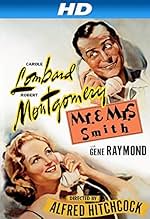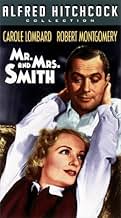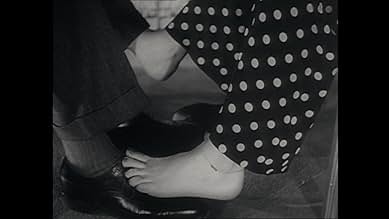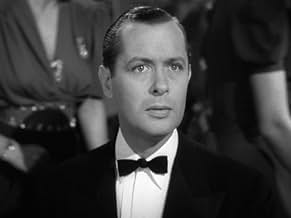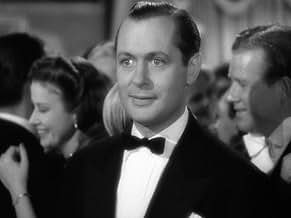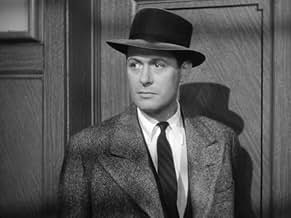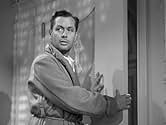AVALIAÇÃO DA IMDb
6,3/10
12 mil
SUA AVALIAÇÃO
Adicionar um enredo no seu idiomaA couple who have been married for three years are shocked to learn that their marriage is not legally valid.A couple who have been married for three years are shocked to learn that their marriage is not legally valid.A couple who have been married for three years are shocked to learn that their marriage is not legally valid.
Pamela Blake
- Lily
- (as Adele Pearce)
Ernie Adams
- Bellhop
- (não creditado)
Ernie Alexander
- Bellhop at Lodge
- (não creditado)
Murray Alper
- Harold - Taxi Driver
- (não creditado)
Tex Brodus
- Nightclub Patron
- (não creditado)
Avaliações em destaque
When I put this movie on I was drowsy, and depressed. It did two things for me after I put it on. It kept me awake, thus entertaining me, and it put a smile on my face.
There are some genuine laughs in this movie, and the comedy is spread between all the characters. Robert Montgomery is extremely funny, with both excellent physical comedy, and great comedic timing with his dialogue. What surprised me most was the excellent comedic timing of Carole Lombard. She is extremely funny, but her chemistry with Montgomery in their scenes together is fantastic.
The direction, of course, is excellent. Not standard Hitchcock suspense, but classic Hitchcock comedy and romance, elements of his film making that a lot of people overlook.
Honestly, this is a fun movie. The humor is intelligent and never sinks to an infantile level. I had never heard of this movie until about two days ago, and I watched it and I was pleasantly surprised. 8 out of 10.
There are some genuine laughs in this movie, and the comedy is spread between all the characters. Robert Montgomery is extremely funny, with both excellent physical comedy, and great comedic timing with his dialogue. What surprised me most was the excellent comedic timing of Carole Lombard. She is extremely funny, but her chemistry with Montgomery in their scenes together is fantastic.
The direction, of course, is excellent. Not standard Hitchcock suspense, but classic Hitchcock comedy and romance, elements of his film making that a lot of people overlook.
Honestly, this is a fun movie. The humor is intelligent and never sinks to an infantile level. I had never heard of this movie until about two days ago, and I watched it and I was pleasantly surprised. 8 out of 10.
The most surprising entry from the filmography of Alfred Hitchcock is his 1941 film, Mr. & Mrs. Smith. Hitchcock claimed he made the film as a favor to lead actress Carole Lombard; Mr. & Mrs. Smith is the only screwball comedy the famous suspense director ever made. Starring along with Carole Lombard is Robert Montgomery; the pair plays a married couple who find out that their marriage is unofficial, and instead of going through the legal paperwork to make their union legal, they question each other and their feelings. Out of his element, Hitchcock put forth a classic comedy that oddly still feels like a Hitchcock film, a true treat for the serious fan as they wade through Hitch's body of work.
Elite New York couple Ann Smith (Carole Lombard) and David Smith (Robert Montgomery) have enjoyed an affectionate, loving, wedded bliss for three years. After individual visits from their lawyers, however, they learn that a municipal technicality prevented their union from being legally recognized. What should be a simple fix, turns into a possible breakup for the couple as they start to wonder how much in love with each other they truly are. The day the couple was told of the technicality, David commented over breakfast that if he were to start his life over, he would never marry. Despite his love for his wife, David feels as though an immense amount of sacrifice of himself has taken place due to his marriage to his wife. That comment has stuck with Ann as she decides what to do about her defunct marriage to her husband. Ann decides that a separation is in order and she begins to live the life of a single woman, even re-adopting her maiden name. As Ann enjoys her new life and freedoms, David sets his sights to stop at nothing to win back the devotion of his wife. Winning back Ann's hand becomes much more difficult as she begins dating other men. As David becomes increasingly more disgruntled with life without his wife, he begins to realize that maybe he wouldn't remove his wife from his life if he had the chance to do it again.
As a fan of classic cinema, I was both surprised and embarrassed to realize that this was the first film I had seen of classic star Carole Lombard. I was happy to change that status and finally see her of a film; I found Lombard's acting exceptional and engaging, and cannot wait to see more of her work. This film is a lot of fun with the slight nods to silent cinema it seems to employ. The ways in which Mr. & Mrs. Smith plays out like a silent film, prove to be a perfect match to the plot of men's and women's relationships of the 1940's. As Lombard gains independence, she enjoys life without her husband more, therefore illustrating the liberation of women in the 40's. Although Mr. & Mrs. Smith has a very Howard Hawks feel to it, it is also clear that there are many aspects recognizable as Hitchcock touches. For instance, this journey through Alfred Hitchcock's filmography, I have grown quite fond of the way in which the auteur films faces. That same unique way faces are filmed are present in this film and are fun to watch. Sure, the film is a comedy, therefore Hitchcock touches are few and far between, but the film doesn't feel foreign to fans of Hitchcock and one can see his touches in it throughout the film. Fans of Hitchcock must see this film, if for no other reason, just to see the famous suspense director trying his hand at comedy; although, if given a chance, one won't be disappointed with a Carole Lombard film, either.
Elite New York couple Ann Smith (Carole Lombard) and David Smith (Robert Montgomery) have enjoyed an affectionate, loving, wedded bliss for three years. After individual visits from their lawyers, however, they learn that a municipal technicality prevented their union from being legally recognized. What should be a simple fix, turns into a possible breakup for the couple as they start to wonder how much in love with each other they truly are. The day the couple was told of the technicality, David commented over breakfast that if he were to start his life over, he would never marry. Despite his love for his wife, David feels as though an immense amount of sacrifice of himself has taken place due to his marriage to his wife. That comment has stuck with Ann as she decides what to do about her defunct marriage to her husband. Ann decides that a separation is in order and she begins to live the life of a single woman, even re-adopting her maiden name. As Ann enjoys her new life and freedoms, David sets his sights to stop at nothing to win back the devotion of his wife. Winning back Ann's hand becomes much more difficult as she begins dating other men. As David becomes increasingly more disgruntled with life without his wife, he begins to realize that maybe he wouldn't remove his wife from his life if he had the chance to do it again.
As a fan of classic cinema, I was both surprised and embarrassed to realize that this was the first film I had seen of classic star Carole Lombard. I was happy to change that status and finally see her of a film; I found Lombard's acting exceptional and engaging, and cannot wait to see more of her work. This film is a lot of fun with the slight nods to silent cinema it seems to employ. The ways in which Mr. & Mrs. Smith plays out like a silent film, prove to be a perfect match to the plot of men's and women's relationships of the 1940's. As Lombard gains independence, she enjoys life without her husband more, therefore illustrating the liberation of women in the 40's. Although Mr. & Mrs. Smith has a very Howard Hawks feel to it, it is also clear that there are many aspects recognizable as Hitchcock touches. For instance, this journey through Alfred Hitchcock's filmography, I have grown quite fond of the way in which the auteur films faces. That same unique way faces are filmed are present in this film and are fun to watch. Sure, the film is a comedy, therefore Hitchcock touches are few and far between, but the film doesn't feel foreign to fans of Hitchcock and one can see his touches in it throughout the film. Fans of Hitchcock must see this film, if for no other reason, just to see the famous suspense director trying his hand at comedy; although, if given a chance, one won't be disappointed with a Carole Lombard film, either.
Mr. Surif was wrong when he calls this Hitch's only venture into comedy, for "The Trouble With Harry" falls into that category as well. Not having seen all of Hitch's films, there could be others, for all I know.
Unlike "Harry", in which the peripatetic corpse gives the otherwise bucolic goings-on a zanily ghoulish air, "Mr. & Mrs. Smith" is an exercise in pure romantic comedy. Montgomery and Lombard work beautifully against each other, and the script is elegantly and effervescently witty. The opening scene, in which Hitchcock suggests the aftermath of a protracted and clearly energetic sexual romp, is surprisingly risque for its time, and far more erotically suggestive than some of the blatant stuff we see nowadays.
My only quibble is what I feel to be a rather unsatisfactory and hasty conclusion.
Unlike "Harry", in which the peripatetic corpse gives the otherwise bucolic goings-on a zanily ghoulish air, "Mr. & Mrs. Smith" is an exercise in pure romantic comedy. Montgomery and Lombard work beautifully against each other, and the script is elegantly and effervescently witty. The opening scene, in which Hitchcock suggests the aftermath of a protracted and clearly energetic sexual romp, is surprisingly risque for its time, and far more erotically suggestive than some of the blatant stuff we see nowadays.
My only quibble is what I feel to be a rather unsatisfactory and hasty conclusion.
Yes, this is an Alfred Hitchcock film, albeit a very different one. The Master of Suspense crosses over to the screwball comedy genre in the 1941 film 'Mr and Mrs Smith'. It's an interesting, yet ultimately flawed exercise.
Hitch filmed 'Mr and Mrs Smith' primarily because of his desire to work with the lovely Carole Lombard. She herself desperately wanted to work with Hitch, though not in a suspense film. He obliged with this piece, also starring comedy regular Robert Montgomery.
The somewhat convoluted plot has Montgomery and Lombard as husband-and-wife David and Ann Smith. One fine day Lombard questions Montgomery over the dinner table with the line 'If you had it all to do over again, would you still have married me?' His reply of 'Honestly, no' is not what she had been expecting. Coincedentally, on the same day David and Ann discover that, due to a technical glitch, they aren't really married after all. Like all, screwball set-ups, havoc quickly ensues.
The problem with Mr and Mrs Smith is that too many jokes simply fall flat on their face. The film does not have enough gags that truly work, with only a few moments that gain a genuine smile. Also, Lombard's character is also portrayed at many times as being unnecessarily cruel. Overall, Lombard and Montgomery play their roles very well, Lombard shines as usual, but the magic just isn't there. There a few good scenes, and probably the funniest is when Montgomery tries to make Lombard jealous in a restaurant.
It's remarkable that this is a Hitchcock film- it feels so American in style. A fun side point to note is that this film contains possibly the first Italian 'Pizza-Pasta' joint in America ever to be put on film.
It's a tragedy that Carole died the following year in a plane crash. She was a great comedic actress who may have blossomed into one of Hitchcock's 'cool blondes' in a suspense film. She certainly had the potential.
6/10
Hitch filmed 'Mr and Mrs Smith' primarily because of his desire to work with the lovely Carole Lombard. She herself desperately wanted to work with Hitch, though not in a suspense film. He obliged with this piece, also starring comedy regular Robert Montgomery.
The somewhat convoluted plot has Montgomery and Lombard as husband-and-wife David and Ann Smith. One fine day Lombard questions Montgomery over the dinner table with the line 'If you had it all to do over again, would you still have married me?' His reply of 'Honestly, no' is not what she had been expecting. Coincedentally, on the same day David and Ann discover that, due to a technical glitch, they aren't really married after all. Like all, screwball set-ups, havoc quickly ensues.
The problem with Mr and Mrs Smith is that too many jokes simply fall flat on their face. The film does not have enough gags that truly work, with only a few moments that gain a genuine smile. Also, Lombard's character is also portrayed at many times as being unnecessarily cruel. Overall, Lombard and Montgomery play their roles very well, Lombard shines as usual, but the magic just isn't there. There a few good scenes, and probably the funniest is when Montgomery tries to make Lombard jealous in a restaurant.
It's remarkable that this is a Hitchcock film- it feels so American in style. A fun side point to note is that this film contains possibly the first Italian 'Pizza-Pasta' joint in America ever to be put on film.
It's a tragedy that Carole died the following year in a plane crash. She was a great comedic actress who may have blossomed into one of Hitchcock's 'cool blondes' in a suspense film. She certainly had the potential.
6/10
"Mr. And Mrs. Smith" is a good comedy about a couple who learn that they haven't been legally married the past three years as they thought they were. The "un-marriage" is based on an absurd notion, but it sets the stage for what follows. And what follows is a comedy of errors and airs in which the groom pursues his bride all over again, while she plays hard to get.
Robert Montgomery and Carole Lombard are the leads as David and Ann Smith. She reverts to her maiden name, Ann Krausheimer when they split up. This isn't one of Carole Lombard's funnier roles, but Montgomery is funny as he jumps through hoops to try to win his wife back. His law firm partner, Jeff Custer, also wants to woo Ann. Gene Raymond plays his part superbly as a real male wallflower. He's straight faced, overly considerate, and straightforward about a relationship with the one-time wife of his best friend and partner. It makes it that much funnier - and frustrating for David.
Some of the funniest scenes are with Jeff's parents. Lucille Watson plays Mrs. Custer, Jeff's mother. She was one of the consummate Hollywood supporting cast who played superbly the role of a shocked mother, or mother-in-law, or snobbish, Puritanical society dame. Philip Merivale is equally aghast as Jeff's father, Ashley Custer. An uproarious scene occurs when Jeff introduces them to Ann. Just as they think she is a sweet, young thing, David enters the office and talks about their coffee together over the morning breakfast table the past three years. The crunch comes when he asks about his laundry, and says he doesn't have any more clean shorts. A type of this scene replays toward the end of the film - with hilarious portrayals of the dumbfounded and astonished Custers.
It's a good thing that David and Jeff owned their own law firm. No one else would have been able to take so much time away from work as David did to pursue Ann. Some reviewers are surprised that this film was directed by Alfred Hitchcock. Hitch was well established as a versatile director before he came to the U. S. just before the start of World War II. He became known for his mastery at mystery films. But he had done a number of comedies, romances and dramas before, and even did one successful musical drama.
This film came out at the end of January 1941. A year later Carole Lombard would be dead. She was killed in a plane crash in Nevada while returning home to California from a war bond drive. She was only 34 years old, but she is remembered today from some of the wonderful films she was in, especially her comedy roles. She was in 80 films in a 16-year career.
On the other hand, Robert Montgomery isn't as well known today. He played a variety of roles in more than 60 films, but ended his silver screen career at age 46 in 1950. He spent the rest of his career in television. His last acting was in 1950-51 in his long-running TV series, Robert Montgomery Presents. After that, he continued to produce that show until 1957 and did some more TV production until 1960. He continued to work in the theater in the 1950s and won the 1955 Tony Award as best director for "The Desperate Hours." In 1968, Montgomery wrote a book entitled "An Open Letter from a Television Viewer" in which he lambasted the TV industry for its programming of violence.
A favorite scene of mine in "Mr. And Mrs. Smith" has Jeff and Ann riding in a sleigh to the cottages they have booked at Lake Placid in the Adirondacks. Ann says, "I love the smell of snow." Jeff says, "No one can smell snow." And Ann responds, "I can." Jeff looks around as though he's sniffing, then looks down at the horses pulling the sleigh and says, "That isn't snow."
The Smiths have one exchange in which Lombard is able to speak the only witty lines in the film. Her Ann Smith says, "As long as we live we must never change that rule." David Smith, "That's right." Ann, "You know, if every married couple had it there would never be a divorce. They ought to put it in the marriage ceremony. You are not allowed to leave the bedroom after a quarrel unless you've made up."
Robert Montgomery and Carole Lombard are the leads as David and Ann Smith. She reverts to her maiden name, Ann Krausheimer when they split up. This isn't one of Carole Lombard's funnier roles, but Montgomery is funny as he jumps through hoops to try to win his wife back. His law firm partner, Jeff Custer, also wants to woo Ann. Gene Raymond plays his part superbly as a real male wallflower. He's straight faced, overly considerate, and straightforward about a relationship with the one-time wife of his best friend and partner. It makes it that much funnier - and frustrating for David.
Some of the funniest scenes are with Jeff's parents. Lucille Watson plays Mrs. Custer, Jeff's mother. She was one of the consummate Hollywood supporting cast who played superbly the role of a shocked mother, or mother-in-law, or snobbish, Puritanical society dame. Philip Merivale is equally aghast as Jeff's father, Ashley Custer. An uproarious scene occurs when Jeff introduces them to Ann. Just as they think she is a sweet, young thing, David enters the office and talks about their coffee together over the morning breakfast table the past three years. The crunch comes when he asks about his laundry, and says he doesn't have any more clean shorts. A type of this scene replays toward the end of the film - with hilarious portrayals of the dumbfounded and astonished Custers.
It's a good thing that David and Jeff owned their own law firm. No one else would have been able to take so much time away from work as David did to pursue Ann. Some reviewers are surprised that this film was directed by Alfred Hitchcock. Hitch was well established as a versatile director before he came to the U. S. just before the start of World War II. He became known for his mastery at mystery films. But he had done a number of comedies, romances and dramas before, and even did one successful musical drama.
This film came out at the end of January 1941. A year later Carole Lombard would be dead. She was killed in a plane crash in Nevada while returning home to California from a war bond drive. She was only 34 years old, but she is remembered today from some of the wonderful films she was in, especially her comedy roles. She was in 80 films in a 16-year career.
On the other hand, Robert Montgomery isn't as well known today. He played a variety of roles in more than 60 films, but ended his silver screen career at age 46 in 1950. He spent the rest of his career in television. His last acting was in 1950-51 in his long-running TV series, Robert Montgomery Presents. After that, he continued to produce that show until 1957 and did some more TV production until 1960. He continued to work in the theater in the 1950s and won the 1955 Tony Award as best director for "The Desperate Hours." In 1968, Montgomery wrote a book entitled "An Open Letter from a Television Viewer" in which he lambasted the TV industry for its programming of violence.
A favorite scene of mine in "Mr. And Mrs. Smith" has Jeff and Ann riding in a sleigh to the cottages they have booked at Lake Placid in the Adirondacks. Ann says, "I love the smell of snow." Jeff says, "No one can smell snow." And Ann responds, "I can." Jeff looks around as though he's sniffing, then looks down at the horses pulling the sleigh and says, "That isn't snow."
The Smiths have one exchange in which Lombard is able to speak the only witty lines in the film. Her Ann Smith says, "As long as we live we must never change that rule." David Smith, "That's right." Ann, "You know, if every married couple had it there would never be a divorce. They ought to put it in the marriage ceremony. You are not allowed to leave the bedroom after a quarrel unless you've made up."
Você sabia?
- CuriosidadesCarole Lombard directed Sir Alfred Hitchcock's cameo and made him do repeated takes.
- Erros de gravaçãoBecause the Smiths entered into the marriage in good faith and were unaware at the time that the marriage was invalid, their marriage is, in fact, still legal under American law.
- ConexõesFeatured in Crimes e Pecados (1989)
- Trilhas sonorasThe Sidewalks of New York
(1894) (uncredited)
Music by Charles Lawlor
In the score during scenes at Mamma Lucy's
Principais escolhas
Faça login para avaliar e ver a lista de recomendações personalizadas
Detalhes
- Data de lançamento
- País de origem
- Idioma
- Também conhecido como
- Casal do Barulho
- Locações de filme
- Empresa de produção
- Consulte mais créditos da empresa na IMDbPro
- Tempo de duração1 hora 35 minutos
- Cor
- Proporção
- 1.37 : 1
Contribua para esta página
Sugerir uma alteração ou adicionar conteúdo ausente




